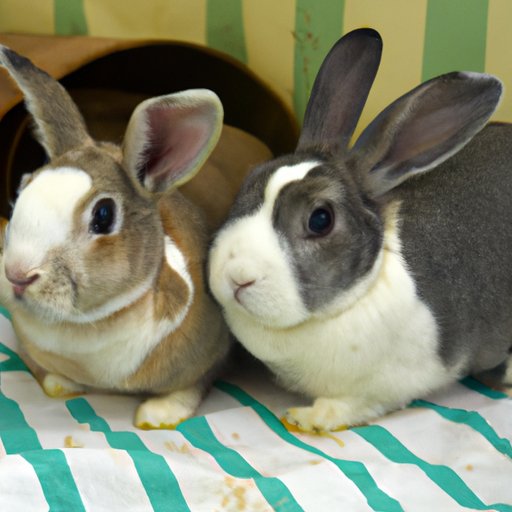Introduction
Having a pet is a great way to bring joy and companionship into your home. While many people opt for cats or dogs, some may want to explore the possibility of having a pet rabbit. But how long do indoor rabbits live? The answer varies depending on the breed, genetics, and environment of the animal, but on average, most rabbits can live anywhere from 8 to 12 years.
It is important to understand the factors that can influence your pet’s life expectancy and to take steps to maximize your rabbit’s life in an indoor environment. This article will explore the typical lifespan of indoor rabbits and provide tips on how to maximize your pet rabbit’s life expectancy.
Maximizing Your Rabbit’s Life Expectancy in an Indoor Environment
The key to maximizing your rabbit’s life expectancy in an indoor environment is providing proper nutrition, ensuring regular exercise, creating a comfortable living space, and protecting your rabbit from stress.
Providing Proper Nutrition
A balanced diet is essential for your rabbit’s health and longevity. A good diet should include hay, fresh vegetables, and a small amount of pellets. Your rabbit should also have access to clean, fresh water at all times. It is important to avoid giving your rabbit too many sugary treats as they can cause obesity and other health problems.
Ensuring Regular Exercise
Rabbits are naturally active animals and need regular exercise to stay healthy and happy. Providing your rabbit with plenty of time to explore and play will help them stay physically fit and mentally stimulated. You can create a stimulating environment for your rabbit by providing toys, digging boxes, and tunnels.
Creating a Comfortable Living Space
Your rabbit needs a safe, comfortable place to call home. A cage or hutch should be large enough to accommodate your rabbit’s size and provide enough room for them to move around freely. The flooring should be made of materials that are easy to clean and made of non-toxic materials. You should also provide plenty of bedding material such as hay or straw to make your rabbit feel safe and secure.
Protecting Your Rabbit from Stress
Stress can have a negative impact on your rabbit’s health and life expectancy. To reduce stress, it is important to provide your rabbit with a quiet and peaceful environment. Avoid handling your rabbit too much and allow them to get used to you gradually. If you notice any signs of stress such as hiding, teeth grinding, or excessive panting, it is important to address the issue immediately.

Exploring Factors That Impact the Longevity of Pet Rabbits
There are several factors that can affect the longevity of pet rabbits. Genetics plays an important role in determining how long a rabbit will live. Some breeds of rabbits such as the Dutch, Mini Rex, and Lionhead are known to have longer lifespans than others. Age is also an important factor; younger rabbits tend to have longer lifespans than older ones.
Health conditions can also have an impact on the longevity of pet rabbits. Common health issues such as dental problems, respiratory infections, gastrointestinal problems, and heat stroke can all shorten a rabbit’s life expectancy if not treated promptly.
What You Need to Know About Caring for an Indoor Rabbit
Caring for an indoor rabbit requires a certain level of commitment and responsibility. Rabbits need to be cleaned and groomed regularly to keep their fur and skin healthy. They should also visit the vet at least once a year for a checkup and vaccinations. Socialization is also important for rabbits; they need to be handled and interacted with regularly to ensure they stay happy and healthy.

The Pros and Cons of Keeping a Rabbit Indoors
Keeping a rabbit indoors has both advantages and disadvantages. On the positive side, they require less space and are easier to care for than outdoor rabbits. They also offer companionship and can be trained to use a litter box. On the downside, they are more prone to health issues due to lack of exercise and can be destructive if not given enough stimulation.

Common Health Issues in Indoor Rabbits and How to Prevent Them
Common health issues in indoor rabbits include tooth problems, respiratory infections, gastrointestinal problems, and heat stroke. To prevent these issues, it is important to provide your rabbit with a balanced diet, regular exercise, and a clean living environment. Additionally, it is important to monitor your rabbit’s health and seek medical attention immediately if you notice any signs of illness.
Understanding the Benefits of Having an Indoor Rabbit as a Pet
Having an indoor rabbit as a pet can be a rewarding experience. Rabbits are low maintenance animals that provide companionship and stress relief. They are also relatively inexpensive to care for and require minimal space. However, it is important to remember that rabbits require regular care, exercise, and socialization to stay healthy and happy.
Conclusion
Indoor rabbits can live anywhere from 8 to 12 years, depending on their breed, genetics, and environment. To maximize your rabbit’s life expectancy, it is important to provide them with proper nutrition, ensure regular exercise, create a comfortable living space, and protect them from stress. Additionally, it is important to be aware of the potential health risks associated with indoor rabbits and take steps to prevent them.


